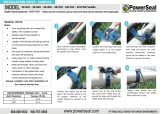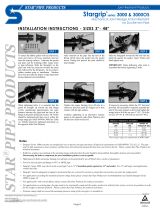
INSTALLATION INSTRUCTIONS
21919 20th Avenue SE • Suite 100 • Bothell, WA 98021 • Phone (425) 951-6200 • 1-800-426-9341 • Fax (425) 951-6201
PRODUCT LIMITATIONS
High Density Polyethylene Pipe (HDPE) has a lower modules of elasticity and higher coefcient of thermal expansion than
other pipe materials. These properties cause HDPE pipe to expand and contract much more from changes in temperature
and/or pressure than other piping materials. Because of these and other properties, great care must be taken when installing
conventional tting on HDPE.
This product has been provided with the proper number of spring washers for the conditions described in the following limita-
tions.
HDPE LIMITATIONS:
• Pipe must be manufactured in accordance with AWWA Standard C906-90.
• Operating temperatures are limited to 85° F maximum and 32° F minimum.
• Operating pressure is limited to 150 psi or the rating of the pipe, whichever is less.
• Pipe systems must be designed to compensate for pipe movement so as to prevent ttings from migrating or rotating on the
pipe.
• Products are intended for use in underground service only.
• Products are not to be used on pressurized HDPE pipe with an SDR greater than 26.
ROMAC CANNOT WARRANT PRODUCTS USED IN APPLICATIONS THAT ARE OUTSIDE ONE OR MORE OF
THESE LIMITATIONS. CONTACT ROMAC’S ENGINEERING DEPARTMENT AT 1-800-426-9341 IF YOU HAVE
QUESTIONS ABOUT THE USE OF OUR PRODUCTS ON HDPE PIPE.
HDPE PRECAUTIONS:
Try always to install ttings when pipe is at its coldest.
Be sure that spring washers are stacked properly (see draw-
ing at right).
This product is designed for a 53° F temperature range maxi-
mum.
PRECAUTIONS
1. Check diameter of pipe to make sure you are using the
correctly sized saddle.
2. Clean pipe to remove as much dirt and corrosion as
possible from the surface.
3. Make sure no foreign materials stick to the gasket as it
is brought around the pipe, nor become lodged between
gasket and pipe as nuts are tightened.
4. Avoid loose tting wrenches, or wrenches too short to
achieve proper torque.
5. Keep threads free of foreign material to facilitate tight-
ening.
6. Bolts are often not tightened enough when a torque wrench
is not used. Take extra care in this situation to make sure
proper tightening occurs.
7. Always pressure test for leaks before backlling.
8. Backll and compact carefully around saddle.
9. When reinstalling, be sure to inspect all parts for
damage and apply additional lubricant to the fasteners.
COMMON INSTALLATION PROBLEMS
1. Bolts are not tightened to the proper torque.
2. Rocks or debris cutting gasket.
3. Dirt on threads of bolts or nuts.
4. Installing in the heat of the day.
Four washersThree washersTwo washers
101S-H/101N-H & 202S-H/202N-H




